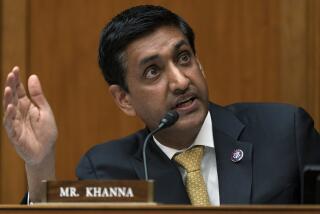Congressman Slips Into Tibet, Slams China
- Share via
WASHINGTON — An outspoken congressional critic of China slipped into Tibet on a tourist visa earlier this month, ditched his government minders and spent four days talking to people and gauging conditions in the inaccessible Himalayan region, the lawmaker said Wednesday.
At a news conference, Rep. Frank R. Wolf (R-Va.) sketched a grim picture of religious and political persecution, harsh prison conditions and an apparent campaign to flood the region with immigrants from other parts of China to make ethnic Tibetans a minority in their homeland.
“I want the world to know what is going on in Tibet,” said Wolf, the first member of Congress to visit the region without being accompanied by Chinese monitors since Tibetan autonomy ended in 1959. “When people know, they will demand that China change its policy of bootheel subjugation and end what one monk I met termed ‘cultural genocide.’ ”
In substance, Wolf’s charges are not new. Although the Chinese Embassy in Washington issued a blanket denial of Wolf’s charges, this year’s State Department human rights report alludes to many of the same conditions. And exiled Tibetans have told their story at the United Nations, to congressional committees and elsewhere. But Wolf added firsthand detail that he obtained in a way that was unorthodox, risky and illegal under Chinese law.
Only one other House member and three senators have visited Tibet in the 38 years since China ended Tibetan autonomy and began to force the assimilation of the ethnically distinct population.
In recent years, Beijing has routinely refused to allow members of Congress to travel in the territory.
Wolf said he did not disclose that he was a member of Congress when he applied for his visa. He said he informed a State Department official in Washington but requested that the information be withheld from the U.S. Embassy in Beijing.
Had he followed normal procedures, he said, “I am sure that my visit would not have been approved, just as other members of Congress requesting permission to visit Tibet have been turned down.”
A bitter foe of legislation giving China most-favored-nation trade status, Wolf has made a legislative specialty of promoting human rights and identifying religious persecution. He made several fact-finding trips to Soviet prison camps before the Soviet Union collapsed in 1991, but he said conditions in Tibet are much worse.
He is the second-ranking Republican on the appropriations subcommittee on foreign operations.
Wolf said he entered China with a group of tourists, accompanied by a Capitol Hill staffer and another person who he said was fluent in the Tibetan language. Realizing that the Chinese government also assigns minders to tourist groups, Wolf said he and his associates slipped away from the group in Tibet and were careful not to talk to residents without taking precautions to make sure they had not been followed.
Wolf said he realized that Tibetans endanger themselves by talking to Westerners. But he said he was approached by many Tibetans, including Buddhist monks and at least one person who said members of his family are political prisoners.
“Prisons seem to be a growth industry in Tibet,” he said. Quoting the person with family members in prison, Wolf said, “Political prisoners are isolated from the general prison population and kept in unlighted and unheated areas with no sanitary or medical facilities and almost no food or water.”
As for religious repression, Wolf said, “Every monastery we visited was tightly controlled by a small group of resident Chinese overseers. . . . Many [monks] were imprisoned for not turning their back on the Dalai Lama [the Tibetans’ exiled religious leader] or even refusing to give up pictures of him.”
He also said the Chinese have colonized Lhasa, the Tibetan capital, which now has 160,000 ethnic Han Chinese and about 100,000 Tibetans. Stores, hotels, bazaars and other businesses are largely run by Chinese, he said.
In response, Yu Shuning, spokesman for the Chinese Embassy in Washington, gave reporters a 12-page statement asserting that Tibetans enjoy “freedom of religious belief.” Moreover, Yu insisted that Tibet’s 2.3 million population is “more than 95% Tibetan.”
More to Read
Sign up for Essential California
The most important California stories and recommendations in your inbox every morning.
You may occasionally receive promotional content from the Los Angeles Times.













